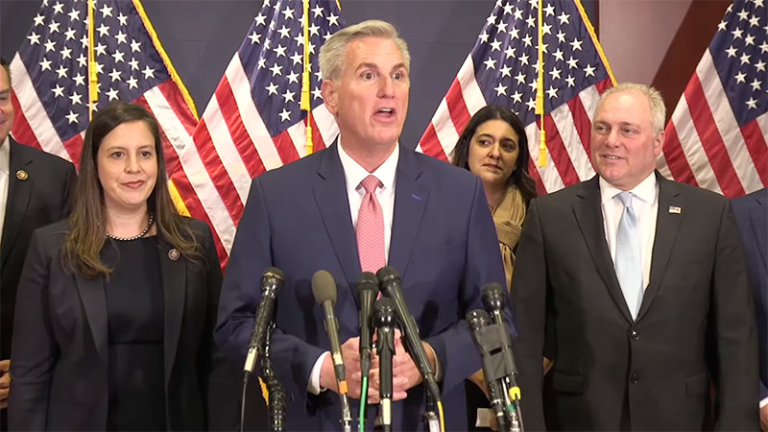
In November, Americans went to the polls to cast their votes in the congressional midterm elections. In the end, voters dealt a major blow to Republican party pundits who had predicted a “red wave” sweeping through the United States, instead electing Democrats in more House, Senate, and gubernatorial races than expected. The Democrats retained their Senate majority, thanks to key victories in states such as Pennsylvania and Nevada, and a December runoff election in Georgia may give President Joe Biden’s party a chance to expand its current 50-seat majority in the chamber to 51. Republicans, however, were victorious in reclaiming the House, in which they are currently set to hold a narrow majority of 220 seats to the Democrats’ 213, with two seats still waiting to be called. Although small, this victory in the House is still significant because Republicans now hold greater legislative power with which to oppose President Biden’s agenda.
In the months leading up to the midterms, a significant foreign policy goal of the Biden administration was a return to the Joint Comprehensive Plan of Action (JCPOA), also known as the Iran nuclear deal. The United States entered the deal in 2015 under the Obama administration, but former President Donald Trump then withdrew from the agreement in 2018 amid his “maximum pressure” campaign on Iran. However, in the months and days leading up to the midterm elections, a return to the nuclear deal was not the only reason that the US government increasingly focused its attention on Tehran.
In September, the death of 22-year-old Mahsa Amini in the custody of Iran’s “morality police,” the Guidance Patrol, sparked massive and widespread protests, which have now been going on for more than two months. Iranian protesters have gained support around the world, including from members of Congress. The US midterms also occurred as news broke of Russia’s increasing use of Iranian-made drones in its war in Ukraine, which drew sharp criticism from American politicians. Meanwhile, during the leadup to the midterms, talks on renewing the JCPOA stalled because of disagreements between Iran and the US and its western allies over the International Atomic Energy Agency’s (IAEA) role and its attempted probes into Iran’s nuclear program.
With Republicans having gained control of the House, the Biden administration is likely to see increased pushback and oversight from congressional Republicans who have already exhibited their opposition to a renewed deal.
With Republicans having gained control of the House, the Biden administration is likely to see increased pushback and oversight from congressional Republicans who have already exhibited their opposition to a renewed deal. While the Republican-controlled House may summon Biden administration officials like Secretary of State Antony Blinken to hearings and hold votes on sanctions and resolutions pushing for accountability, the Democratic-led Senate will likely remain more loyal to President Biden, not because Democrats support the deal, but because of the intricacies of partisan politics and concerns about the looming 2024 presidential election. The outcomes of the US midterm election, combined with Iranians’ continued protests and increased scrutiny over Iran’s role in the Russian invasion of Ukraine, make a US return to the JCPOA highly unlikely to occur anytime soon.
House Republicans and Iran
Although the Biden administration’s attempted return to the nuclear deal was not a key issue in most midterm election campaigns, House Republicans made their opposition to negotiations with Iran very clear. With their victory in the House, Republicans will now have control over both the chamber and its committees, allowing them to determine which House legislation is considered, including legislation related to Iran and the JCPOA.
A key player to watch in the coming months is Representative Michael McCaul (R-Texas), the current ranking member of the House Foreign Affairs Committee (HFAC), who is expected to become its chair once the 118th Congress convenes. McCaul is no stranger to US foreign policy, nor to Iran, and has a track record of making statements and sponsoring legislation against the Islamic Republic, which indicates that he will likely oppose the Biden administration on many issues around Iran, and especially on the JCPOA.
McCaul has already made his case for increased oversight of the Biden administration’s foreign policy, having promised to investigate the administration’s 2021 withdrawal from Afghanistan if Republicans were to regain control of the HFAC. And his calls for congressional oversight in foreign policy also extend to Iran. In August, McCaul sent a letter to President Biden calling on the administration to report to Congress on the status of the JCPOA negotiations, using the pretext of the Iran Nuclear Agreement Review Act, which provides Congress with the power to review any renewed nuclear deal with Iran. With Republican control of the House and the HFAC secured, McCaul will have increased oversight power that he can exercise using subpoenas, hearings, and control over legislation, power that may force the Biden administration to be more transparent about the status of nuclear negotiations.
In addition to calls for oversight, McCaul and other Republicans have made it clear that they feel that the Biden administration should walk away from negotiations altogether. The Iranian regime’s violent suppression of protesters following the death of Mahsa Amini has only fueled preexisting anti-Iran sentiment on Capitol Hill. For example, in response to the violence in September, HFAC Republican members plainly said that the administration “should walk away from a flawed nuke deal that would embolden and enrich a corrupt regime that violently attacks its own people.”
The proliferation of Iranian drones sent to Russia for use in its war in Ukraine has added additional fuel to the fire. In November, McCaul sent another letter to President Biden, urging the administration to take immediate action to combat and deter Iran’s provision of drones to Russia and advocating for the enforcement of existing sanctions and the introduction of new ones in order to prevent weapons proliferation. McCaul’s reaction to news of Iran’s drone program is significant, as it signals the willingness of a Republican-led House to increase sanctions on Iran over weapons proliferation and other activities, pushing the United States further away from a nuclear deal, which is premised on sanctions relief.
McCaul’s reaction to news of Iran’s drone program is significant, as it signals the willingness of a Republican-led House to increase sanctions on Iran over weapons proliferation and other activities, pushing the United States further away from a nuclear deal, which is premised on sanctions relief.
McCaul is not alone in his calls, as other Republicans in Congress have regularly pushed for increased sanctions pressure on Iran in recent months. In September, Representative Mike Waltz (R-Florida) and Senator Joni Ernst (R-Iowa) introduced the PUNISH Act, a bill that would codify President Trump’s “maximum pressure” sanctions on Iran into law and prohibit the Biden administration from lifting sanctions if the US reenters a nuclear deal. Meanwhile, in October, Representative Jim Banks (R-Indiana) introduced a bill to impose sanctions on Iranian President Ebrahim Raisi and Iranian Supreme Leader Ayatollah Ali Khamenei. Republican control of the House will allow the party to counter nuclear negotiations through a return to maximum pressure-type sanctions via legislation. Although Democrats will retain control of the Senate and the White House, an increase in the amount of sanctions legislation introduced in the House could cause the Iranian regime to step away from negotiations.
Bipartisan Senate Opposition
Key members of the Democratic Senate leadership, along with their Republican allies, will also likely continue to oppose President Biden’s pursuit of a renewed nuclear deal with Iran. Two important figures to watch in January will be Senator Bob Menendez (D-New Jersey) and Senator Jim Risch (R-Idaho), chair and ranking member of the Senate Committee on Foreign Relations. Both Senators have been vocal about the ongoing Iranian protests and have directly challenged the Biden administration’s approach to Iran.
In his initial formal statement on the protests, Menendez said that the United States must use “every peaceful tool” to support the aspirations of protesters, and then, two weeks after the midterm elections stated that the Biden administration could push even further with sanctions. Even before the protests began, Menendez—a long-time critic of the JCPOA—vowed to have the Committee on Foreign Relations review any nuclear agreement the Biden administration attempted to enter. Senator Risch has taken his own statements a step further, directly calling on the Biden administration to end nuclear negotiations over the Iranian regime’s response to the protests.
Overall, members of the Senate seem to share a bipartisan stance opposing a renewed nuclear deal, as well as a view of Iran that is largely critical, especially when it comes to the protests, which have already been the subject of bipartisan resolutions. This bipartisanship exists in the House as well, where, in September, 34 Democrats joined 16 Republicans in asking the Biden administration for an in-depth briefing on the proposed nuclear agreement.
With the 2024 presidential election approaching, a Republican-controlled House is likely to attempt to bring scrutiny to the administration’s nuclear negotiations with Iran. Meanwhile, Senator Menendez and other Democratic Senate leaders will be incentivized to work with the President in the leadup to this major election. Even though opposition to a renewed JCPOA may come from both sides of the aisle, Republicans have both the political incentive and the will to drag the Biden administration over the issue.
Will the Biden Administration Resist Congress?
It is unclear if the Iran deal will remain a key foreign policy goal of the Biden administration in the coming months. On November 30, the administration’s chief Iran negotiator Robert Malley cast doubt on the possibility that a deal would come anytime soon, stating in an interview, “I do want to emphasize we’re not spending our time now focused on the deal. Our focus is on what’s happening in Iran and Iran’s support for Putin’s war of aggression in Ukraine.” Malley also made it clear that Iran’s position regarding IAEA inspections of its nuclear program remains a crucial impediment to progress on a renewed deal.
Malley’s recent comments track well with the Biden administration’s policies during the midterm election season. In the time since the start of protests and the discovery of Iranian drones in Ukraine, the administration has regularly sanctioned Iranian security officials involved in human rights violations, as well as Iranian and foreign companies that have facilitated the sale and transport of Iranian weapons, petroleum, and petrochemical resources. This campaign of targeted sanctions confirms that the Biden administration’s Iran policy is not currently focused on a return to the JCPOA.
In the time since the start of protests and the discovery of Iranian drones in Ukraine, the administration has regularly sanctioned Iranian security officials involved in human rights violations, as well as Iranian and foreign companies that have facilitated the sale and transport of Iranian weapons, petroleum, and petrochemical resources.
Despite the Iran nuclear deal having already faced substantial bipartisan opposition, domestic politics will play a huge role in stances on the JCPOA during the upcoming Congress. Republicans who will control key positions in the House are not only driven by a wariness of the Biden administration’s perceived lack of transparency in negotiations; they also have a strong political incentive to target the administration on this divisive issue prior to the 2024 election. And although key Senate Democrats have expressed their opposition to working with the Iranian regime, they are unlikely to target a Democratic administration ahead of a presidential election. Between the likelihood of continued Republican opposition and the Biden administration’s embrace of sanctions rather than a renewed focus on negotiations with Iran, it seems all but certain that there will not be a US return to the JCPOA anytime soon.
Featured image credit: YouTube/repkevinmccarthy

